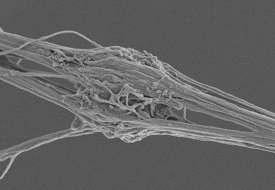Learning and Problem Solving
If consciousness is the jewel of the Universe, and if gaining new knowledge is how we come to know God and fulfill our destinies as cognitive beings, we should like to understand the biology of learning. This leads us into the discipline of cognitive neuroscience.The previous section identified pleasure and pain as the source of all motivation. They're also (somehow) important in learning, though identifying the actual physical mechanisms responsible for translating rewards and punishments into learned behaviors has proved difficult. The main problem is that the scales are different by six orders of magnitude, from the microscopic neurons (at left), to the macroscopic behaviors of people (at right), and we don't currently have the technology to assess the states of the ~100 billion neurons in a typical human brain, much less add all of them up to predict the aggregate behaviors. So there is a huge gap in our understanding, and at present, scientists are only beginning to imagine a mechanistic science of higher learning. In a mature form, such a science will reveal more efficient ways of using our brains, and this will unlock a lot more of our potentials. But we're a long way from there. So this section is presented, not because it is so thoroughly proven as to beg inclusion in a working belief system, but because it merely suggests that a rational belief system could include a scientific understanding of rationality itself. This is also a great opportunity to make the point that EBS, being based on science, is an open-ended inquiry, which should continue to evolve as long as science is still making progress. And surely, this topic will be doing just that for a very long time.As an aside, no study of the human brain would be complete without an analysis of the structure and function of the cerebellum, since an estimated 60% of the neurons in the cranium are devoted to it. While other theorists believe that it is inextricably intertwined with higher reasoning, it's possible that its purpose is actually very primitive, and that it need not be considered in the study of consciousness.Summary
- It is our nature to focus on success, and to forget failure.












